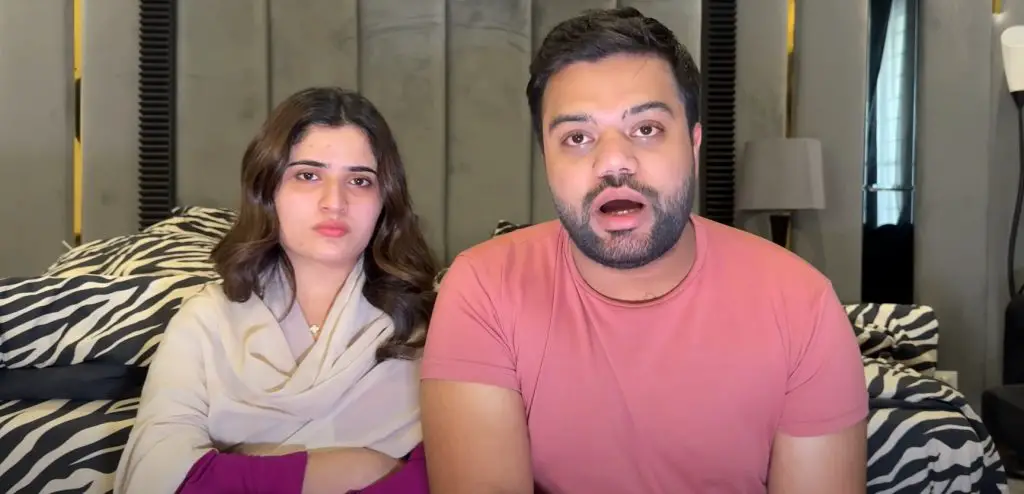Digital Scandal: Ducky Bhai's Wife Aroob Jatoi Deepfake AI Video

In an era where digital content can be manipulated with disturbing ease, the incident involving Aroob Jatoi, the wife of popular YouTuber Ducky Bhai (Saad ur Rehman), stands as a stark reminder of the dark side of AI technology. This article explores the multi-faceted scandal involving a deepfake AI video that purported to show Jatoi in a compromising light, igniting widespread controversy and discussion about the implications of such technology.
This article examines the deepfake scandal involving Aroob Jatoi, discussing its impact, legal issues, and societal reactions. It emphasizes the urgency of addressing AI misuse.
Table of Contents
What is deepfake AI video?
Deepfake technology utilizes artificial intelligence to create or alter video content so convincingly that it becomes difficult to distinguish real from fake. Typically, it involves superimposing existing images and videos onto source images or videos using a machine learning technique known as a generative adversarial network (GAN). The result is a video that can misrepresent someone saying or doing things they never actually did, often used maliciously to damage reputations or deceive the public.
What happened to Ducky Bhai's Wife Aroob Jatoi?

A disturbing incident shook the internet when a deepfake AI video featuring Aroob Jatoi, wife of popular YouTuber Ducky Bhai, was maliciously circulated online. The video, created using advanced artificial intelligence, falsely depicted Aroob in compromising situations, sparking widespread outrage. This video rapidly spread across various social media platforms, drawing attention to the potential harm and misuse of deepfake technology. The incident not only highlighted vulnerabilities associated with digital content but also raised questions about privacy, consent, and the ease with which digital identities can be exploited.
Also read: Explicit AI Photos of Paige Bueckers: Confronting Digital Violations
Ducky Bhai's response to Aroob Jatoi deepfake AI video

Ducky Bhai, a prominent YouTuber, responded with urgency and clarity to the deepfake video scandal involving his wife, Aroob Jatoi. Recognizing the severity of the issue, he took multiple steps to address the situation: he publicly denounced the video, educated his audience about the dangers of deepfake technology, offered a reward for information leading to the identification of the perpetrators, and collaborated with authorities to seek justice. His comprehensive approach aimed to not only resolve the immediate issue but also to raise awareness about the broader implications of digital misinformation.
Immediate Denunciation
Ducky Bhai quickly took to social media to clarify that the video circulating was a deepfake. He vehemently denounced the content as false and malicious, emphasizing the dangers of deepfake technology and its potential to harm individuals unfairly.
Educational Efforts
Understanding the lack of widespread knowledge about deepfakes among his audience, Ducky Bhai used his platform to educate his followers. He explained how deepfake videos are created and why they represent a significant threat to privacy and consent, aiming to raise awareness about the misuse of AI technologies.
Call to Action
In a decisive move, Ducky Bhai announced a reward of Rs 1 million for information leading to the identification of the person or group responsible for creating the deepfake video. He urged his fans and viewers to report any suspicious activities or information, emphasizing the importance of community vigilance in combating cybercrimes.
Collaboration with Authorities
Ducky Bhai also disclosed his plans to work closely with law enforcement and cybercrime units. By cooperating with the authorities, he aimed to ensure that the culprits were brought to justice and to highlight the need for legal measures against such digital offenses.
How does deepfake AI video affect Aroob Jatoi?

The release of the deepfake video had a profound and distressing impact on Aroob Jatoi, showcasing the severe consequences of digital impersonation.
- Emotional distress: The video caused significant psychological stress and anxiety for Aroob.
- Privacy invasion: A gross violation of her privacy, highlighting the lack of control individuals have over their digital representations.
- Public scrutiny: The incident thrust her unwillingly into the spotlight, subjecting her to public scrutiny and judgment.
Also read: The Taylor Swift AI Outrage: Fans Rally Against Deepfake Dilemma
Legal and ethical concerns behind Aroob Jatoi deepfake AI video
The deepfake video of Aroob Jatoi brings to light several pressing legal and ethical concerns regarding the use of AI in creating deceptive content.
- Privacy Invasion: Creating and distributing a fake video infringes on the privacy rights of the individual.
- Consent Violation: The use of Jatoi’s likeness without her consent highlights the need for laws addressing digital consent.
- Potential for Harm: The ease with which reputations can be damaged points to the need for stricter regulations on AI technologies.
How does social media react to the spread of deepfake AI?
Social media’s response to the spread of deepfake AI, as seen in the Aroob Jatoi incident, was marked by widespread condemnation, support for the victims, and increased educational efforts. This reaction reflects growing concerns about digital ethics and the urgent need for measures to combat AI-driven misinformation.
Widespread Condemnation
The circulation of the deepfake video of Aroob Jatoi prompted widespread condemnation on social media. Users voiced outrage over the misuse of AI to create deceptive content, calling for stronger moderation policies and advanced detection systems to prevent similar abuses.
Support and Solidarity
The online community showed strong support for Aroob Jatoi, with many expressing sympathy and solidarity. Influencers and public figures used their platforms to denounce the deepfake, highlighting the emotional and reputational damage such content can cause.
Educational Outreach
Following the incident, there was a notable increase in educational content about deepfakes. Experts and activists provided insights into how deepfakes are created and their potential impacts, aiming to educate the public on how to identify and report such content.
Apple Remove AI Apps from its store
In a significant move, Apple removed multiple applications from its App Store that facilitated the creation of AI-generated non-consensual nude images, including deepfakes. This decision came in response to growing concerns about privacy violations and the ethical implications of such technologies. Apple’s action reflects its commitment to user safety and ethical standards, setting a precedent for other tech companies. The removal of these apps underscores the tech giant’s stance against tools that could harm users or contribute to digital abuse. Apple’s initiative also highlights the broader tech industry’s responsibility in managing the potential negative impacts of AI applications, pointing towards a future where tech companies may need to adopt more stringent policies regarding AI tools.
The future of AI video in the Tech Industry
The controversy surrounding the deepfake video of Aroob Jatoi has sparked significant discourse on the future role of AI video technology in the tech industry.
- Stricter Regulations: Anticipating more rigorous laws governing AI video creation and distribution.
- Advancement in Detection Technologies: Development of more sophisticated AI that can detect and flag deepfake content automatically.
- Ethical AI Deployment: Emphasizing the ethical deployment of AI technologies, ensuring they are used to enhance societal well-being without infringing on personal rights.
How can society prevent future AI video scandals?
Legal Reforms
To combat the proliferation of deepfake videos, comprehensive legal reforms are necessary. These reforms should aim to clearly define and criminalize the unauthorized creation and distribution of AI-generated content. Implementing stringent penalties and providing clear legal recourse for victims will deter malicious use and establish a legal framework that keeps pace with technological advancements.
Public Education
Educating the public about the nature and dangers of deepfake technology is crucial. Awareness campaigns can equip people with the knowledge to recognize and report deepfakes. Schools and community programs should include media literacy as a core subject, focusing on the challenges posed by modern technology, including AI and deepfakes.
Technological Solutions
Investing in technology to detect and prevent the spread of deepfakes is essential. Tech companies should prioritize the development of AI systems that can identify and neutralize deepfake content. Partnerships between academia, industry, and government can accelerate the development of these technologies, making them more accessible and effective.
Conclusion
The scandal involving Aroob Jatoi’s deepfake video highlights the dual edges of AI technology—the vast potential for innovation and the significant risks of misuse. It is imperative that as society moves forward, it balances technological advancement with ethical considerations and robust regulatory frameworks. By fostering a culture of responsibility and awareness, both at the individual and corporate levels, we can harness the benefits of AI while safeguarding against its potential harms.

